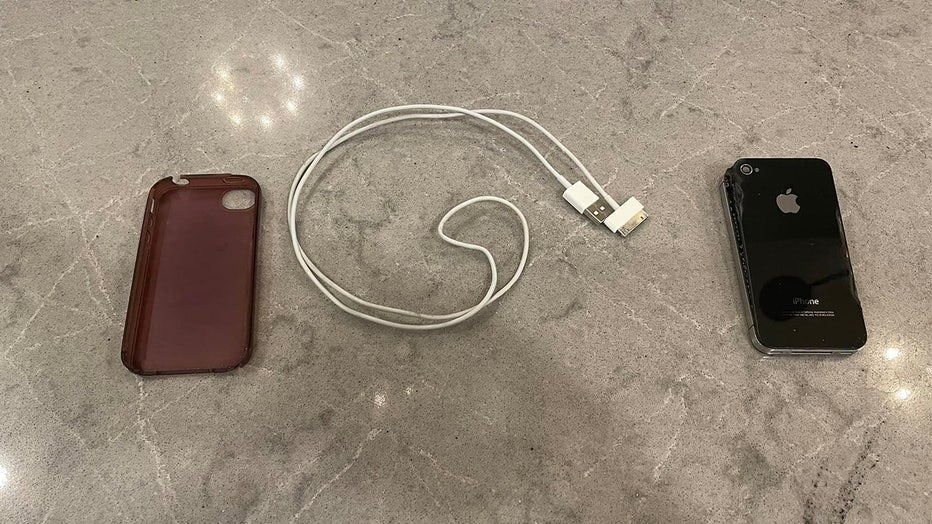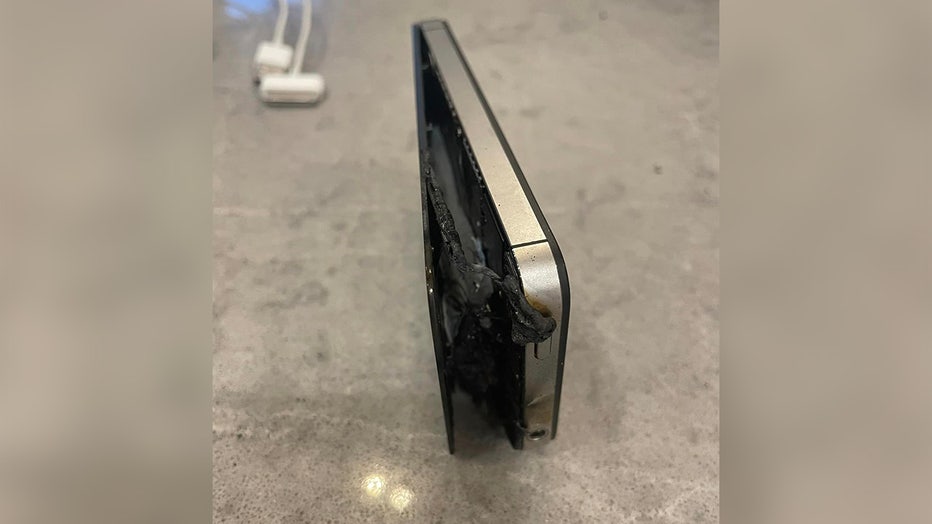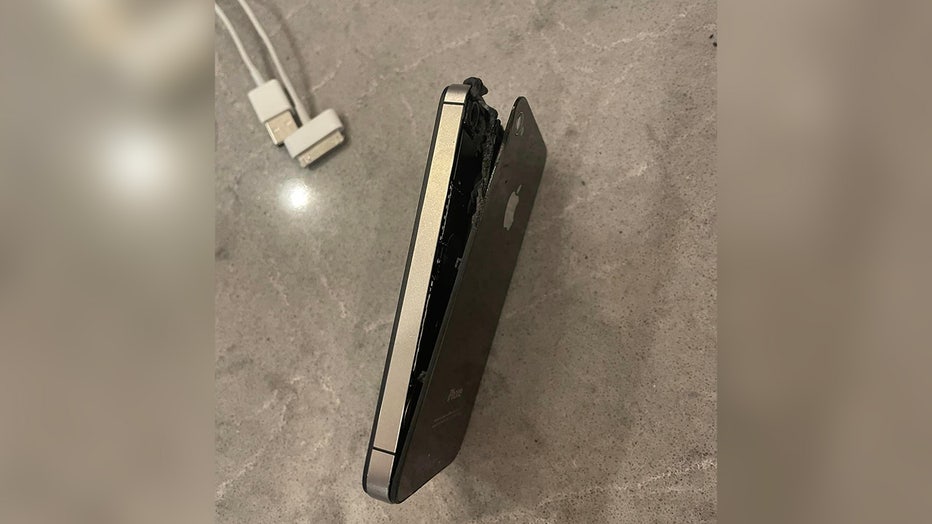Watch: iPhone catches on fire while charging in Ohio family’s kitchen
iPhone bursts into flames while family sleeps
An Ohio family was shocked to find their iPhone 4 destroyed on their kitchen counter only to find that overnight, the phone had suddenly burst into flames while charging. Luckily, the fire was unable to spread further and eventually put itself out.
CINCINNATI - An Ohio family is relieved that nothing in their home was seriously damaged or worse, burnt to a crisp, when their security cameras captured one of their iPhones bursting into flames while everyone was fast asleep.
Jennifer Leisgang and her family hope that their story will keep other families from suffering a worse fate than they did.
On Jan. 9, at around 1 a.m., Leisgang said she and her family were asleep when an iPhone 4 that was left charging on their kitchen counter suddenly burst into flames.
Leisgang told FOX TV Stations that the phone was charging with an original Apple charger.
Home security camera footage shows a small fire igniting and then violently burning on the countertop for a few minutes before slowly beginning to fizzle down.
The next morning, Leisgang and her husband, Brian, were met with a highly unusual scene — soot all over the countertop and a broken and blackened phone.
"It had a silicone case on it that cracked off and the phone split open. And there was black soot all over the countertop and on the chairs and on the floor," Leisgang said.

Jennifer Leisgang's destroyed iPhone 4 with the original Apple charging cable and the damaged phone case. (Jennifer and Brian Leisgang)
Thankfully, Leisgang’s husband had cleared the island which is usually covered in their children’s schoolwork and other miscellaneous objects before heading to bed the night before.
"I realized how lucky we were that we didn’t have anything on the countertop and that it just went out on its own," Leisgang added.
Leisgang’s husband shared the video and photos of the aftermath on Facebook as a warning to other Apple users to be vigilant and ensure their electronics are charging away from anything that could potentially catch on fire.

Melted components inside Leisgang's iPhone 4. (Jennifer and Brian Leisgang)
"We were extremely lucky to avoid a house fire," Brian wrote on Facebook.
Leisgang said that she, as well as other parents she knows, use older products like the iPhone 4 to simply give their younger children something with which to watch videos.
But after seeing what happened to her "vintage" device, she wanted to know, how old was too old?
Leisgang said she did file a claim with Apple hoping to get some sort of advice when it comes to older Apple products, but the company was unable to give a straightforward answer.
"Their verbal response, and I am paraphrasing because I did not write it all down, was that my device was vintage and they don’t expect their clients to be using a phone that old," Leisgang said. "They did not really have an answer."
Leisgang said the company did ask for her to send in the phone in order for more research to be conducted.

The aftermath of the fiery explosion shows Leisgang's iPhone 4 slightly melted and split. (Jennifer and Brian Leisgang)
"They were going to mail me a check for a replacement device but I declined their offer. I didn’t want anything out of this, I was just reporting it after I heard so many other stories," Leisgang explained.
Leisgang said the last she heard about her claim was that it was taken over by Apple’s corporate executive relations and she hasn’t heard back about the claim since.
"How old is too old to still be using?" Leisgang posited. "An Apple phone is kind of like a mini computer if you have it connected to wi-fi. It’s a camera. You can watch videos on it. You can take videos. You can watch YouTube. There’s a lot of households still using 4s and 6s out there and the original Apple iPads."
Apple told FOX TV Stations that they were aware of the incident involving Leisgang’s device and were "looking into the matter further."
Previous Apple product controversy
This isn’t the first time an Apple product suddenly combusted.
In 2009, Apple actually launched an investigation after multiple reports of people’s iPhones exploding throughout Europe.
In 2012, a Colorado woman’s iPhone 4 began to sizzle and smoke while on the bedside table next to her, according to a Mashable report.
Similarly, in 2016, a man in Atlanta, Georgia, was charging his iPhone 6 when it suddenly burst into flames and in 2017, an Australian man’s car was set on fire by an iPhone 7 which was left inside the car while the man went surfing.
Also noteworthy is the Samsung Galaxy Note 7 debacle of 2016 when the company actually had to halt sales because the devices would explode while charging.
Apple’s batteries were also the subject of consumer uproar in 2017 after the company admitted it had slowed down batteries on older iPhones for technical reasons.
"We apologize," the company said on its website . "We have never — and would never — do anything to intentionally shorten the life of any Apple product, or degrade the user experience to drive customer upgrades."
The slowdown started with iOS 10.2.1 in 2016, Apple said, to improve power management "to avoid unexpected shutdowns on iPhone 6, iPhone 6 Plus, iPhone 6s, iPhone 6s Plus, and iPhone SE."
Apple’s admission led to the company offering discounted battery replacements at $29, but many people claimed they had already spent hundreds of dollars to buy new phones because Apple didn’t reveal the cause of the problem. If they had known they could just buy new batteries, they might not have bought new phones, some consumers said.
A class-action lawsuit filed in California regarding the slowed batteries ordered the company to pay $500 million, including about $93 million to lawyers representing consumers.
Apple did not admit wrongdoing in the lawsuit.
IPhone users who were named in the case would get up to $3,500 each. The rest of the settlement money would be distributed to owners of iPhone 6, 6S, 7 and SE models who met eligibility requirements related to the operating system they had running at the time.
What causes some phones to ‘explode?’
The reason behind the malfunctioning phones is largely due to the battery. Many — if not all — smartphones have lithium-ion batteries.
Lithium batteries are popular because they pack significantly more energy into a small package.
But their chemistry makes them more likely to catch fire under certain conditions because, unlike other rechargeable batteries, they contain a flammable electrolyte and are kept pressurized.
If the batteries have a manufacturing flaw, are damaged, are packed too closely together, are overcharged or are exposed to excessive temperatures they can overheat, causing a condition known as "thermal runaway."
That’s a situation in which an increase in temperature causes continuous further increases — a kind of uncontrolled positive feedback. If a single battery overheats, it can cause other nearby batteries to overheat and experience thermal runaway as well. The flammable electrolyte can also ignite.
How to prevent your phone from exploding
Again, while it is very rare, there are several ways to avoid any potential spontaneous combustion when it comes to your iPhone or any smartphone.
Get a phone case
Dropping your phone and potentially damaging your battery is one way that can lead to a fiery outcome, according to PC Mag.
Again, not every phone will immediately explode after it is dropped without a case but it’s better to play it safe than sorry.
Avoid extreme temperatures
Overheating a smartphone’s battery has been linked to cases of malfunctioning devices.
But even extremely cold temperatures can negatively impact a phone battery’s shelf life, PC Mag said.
It’s best to keep your phone in moderate temperatures if you can help it.
Don’t cover your phone while it charges
So basically, do not keep your charging smartphone under your pillow while sleeping. This can lead to overheating, which as it was mentioned above, can lead to disastrous effects.
Practice good ‘battery hygiene’
While it’s nice to have your phone charged at 100% every time you decide to go out or are preparing for some major scrolling through social media before bed, it’s actually best to keep it anywhere between 30% and 80% charged.
Apple’s website actually advises consumers to only keep a 50% charge on a device’s battery.
The Associated Press and FOX News contributed to this report. This story was reported from Los Angeles.

